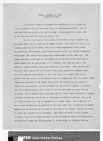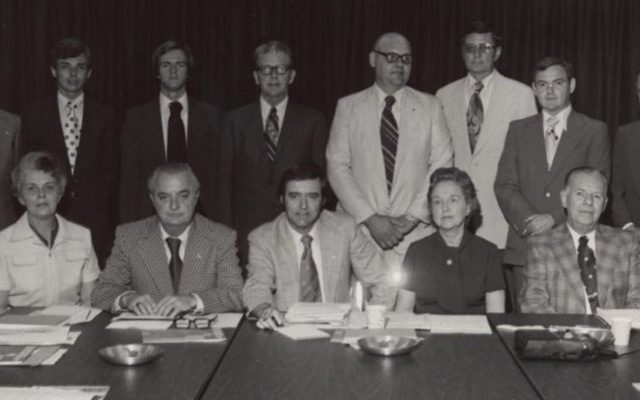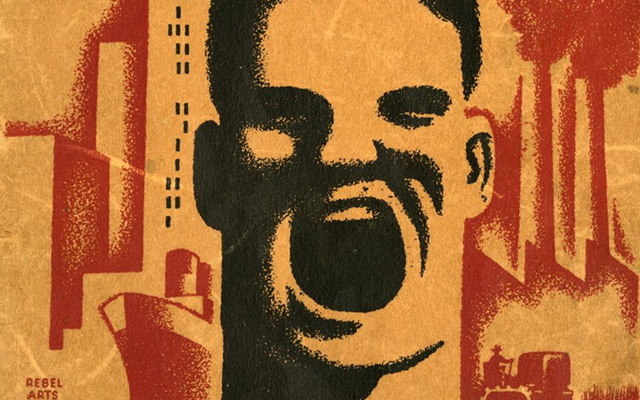Chapel, January 21, 1927
President Wright
I am going to talk to you about the legislature this morning, and
I am not going to tell you very much about the legislature because I have no idea what they are going to do, and from what I could gather this week, they do not have any idea what they are going to do.
For the first time in the history of the state we have operated for two years under what is known as the Budget System. That means the all of the spending agencies in the state, such as the state departments of all kinds,
the hospitals, the colleges, every spending agency except the highway commission, every agent that spends state money has a budget made out two years ago. The
budget was made by the year for two years, and at the end of the first year a
second budget for. the second year of the biennium was made and sent to the
Executive Budget Officer, who is the Governor of the state. Each quarter,(and the state year begins with the first of July, July, August and September make the first quarter) each quarter in each year there is a budget made for the quarter and each month in each quarter there is a budget made for that month. These
budgets are submitted to the Budget Bureau with the Governor as the executive head of it and approved. If the allotment for the month of January is approved, then the spending agency, this college it may be, can spend the money that is
allotted. The allotments have to be made under at least twelve headings or objects, and these objects are cut up into a multitude of so-called functions. Now, I am
not going to ask you to try to remember all of these terms. That I want you to
see is that we work out the spending of the money under what is known as the Budget Bureau with the Governor of the State as the head of the bureau. He has the right to reduce any request for an allotment. That means we cannot be able, always
be able, to get what we want and what we think we ought to have, but usually after the quarterly budget has been approved, if we run short, we transfer from one
-2-
division to another, and in that way we get along very well.
At the end of the two year period the Governor, who is the executive
head of the budget, is required by law to make out a report showing all receipts and all expenditures, the surplus or deficit, whatever it might be, of the spending
the spending agencies are
agencies, and/required to put in their estimates of the needs of the next two years.
Then the Budget Commission, composed of the Governor and six other people, take these requests, go over them carefully and decide what they will recommend to the General Assembly to be appropriated for the various spending agencies. They are also required to draw up a law known as the Revenue Act, I mean a proposed law known
as the Revenue Act and submit it to the General Assembly, also to draw up a proposed not for the maintenance of all the spending agencies and institutions in the state, saying how much each institution, for instance a place like Greenville, may spend and for what purpose it may be spent divided up under twelve objects
for each year of the biennium. They are also required to draw up a law
providing for the amount of money that is to be scent by bond issues for permanent improvements of all kinds.
After all this is done and this report of the Executive Budget has been submitted to the legislature, none of this is law, it is proposed law. The law requires the executive heed of the Budget System. to have all of this done, but
it is not law that it should be spend as recommended by the Budget Commission. They simply get it all together in shape and submit it to the legislature, and then the
legislature may do with it as it sees fit. It may reduce the appropriations or it
may increase the appropriations for maintenance and for permanent improvements. The reportof the Budget Commission is I don't know how many hundreds of pages. It takes some time to give it the necessary study to act on it with intelligence, and
the legislature at present is right at that stage. They do not know what they want
-3-
to do. They are studying the report and they have the proper authorities from all the spending agencies to come before the Appropriations Committees, and ask them all kinds of questions and get all kinds of added information. They will want to know, for instance, if we can live on the maintenance appropriation, and if we cam do what is necessary to be done with the appropriation for permanent improvements if we get no more than they propose to spend here.
I was supposed to go before the appropriations committee last 'Wednesday, but the hearing was postponed, and I will go before them about next Thursday, maybe today week. Next Friday I will know more than I know now, but I do not know that I will be able to tell you any more than I have told you this morning. I wanted to just give you that outline that you might get a clear conception of
what the Executive Budget System means. Personally, 1 think they are putting too
much authority in the Governor. I think they should give some of the authority
that is given to him to the Boards of Trustees. For instance,we cannot change
from one object to another except by written request and approval from the Governor. I think the Board of Trustees of an institution know best when to make a transfer from one object to another, because they are better informed and know more of the urgent needs of an institution than the Executive Head of a great state can possibly give the time to learn.
I do not know what the legislature is going to do. They do not know.
It is the moat interesting legislature to watch from the sidelines that I have ever had any dealings with, and I have been having dealings with legislatures since
1909 every two years. I have had some very interesting experiences, but this is the most interesting so far that I have ever had.
We need, urgently need, every cent we are asking for the maintenance of this college and for permanent improvements. I feel pretty sure this morning
in saying that we are not going to get it, but I also feel just as sure that
-4-
we are going to fight just as hard as we can to get it, because the state ought to spend the money here.
Just one other thing and I an through, there is a wave in Raleigh that would make one believe that North Carolina is just on the verge of bankruptcy. I did not know that me had quite so many rich poor people. You know there is a
difference between rich poor persons and poor rich persons. Taxation is high in
North Carolina, we all know that, but it is net the state taxation, and that is
a point that people have failed to see, because the state hasn't done certain things, the local communities are doing it. We are never quite so poor in North Carolina
as we think we are when the legislature is in session. A good friend of mine said, "Mr. Wright, lie can't do it. We just can't get any more taxes." I said, "All right, let's not have any at all. Let's get less." He said, "You know we can't do that. We have got to go forward." I said, "If we go forward, we have
got to pay for it." I said,"ln other words, you are not willing to pay any more!
North Carolina is very poor in Raleigh. today, but the bank accounts show that
we are in good condition as a people.




